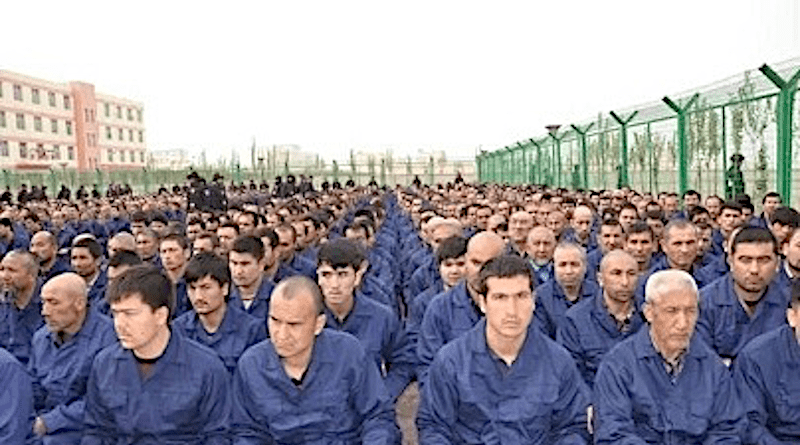Calling Beijing Out On Xinjiang Abuses
While American athletes will be giving their all at the Winter Olympics in China starting next week, diplomats and officials from the US and several allied countries will be giving the games a miss. The so-called “diplomatic boycott” is a symbolic protest against Beijing’s well-documented human rights abuses, particularly its oppression of Uyghur Muslims in the Xinjiang Autonomous Region.
The US State Department has characterized China’s treatment of Uyghurs as “genocide,” citing an extensive list of abuses including the imprisonment of more than a million civilians; forced sterilization and abortions; rape; involuntary labor; and the imposition of draconian restrictions on freedom of religion, expression, and movement. And last month Congress passed the Uyghur Forced Labor Prevention Act with bipartisan support, which strengthens tools for barring imports from Xinjiang under the assumption that all are tainted by human rights abuses.
In Economic Diplomacy and Genocide in Xinjiang, a recent AsiaPacific Issues paper from the East-West Center,authors Cullen Hendrix and Marcus Noland explore what further kinds of economic diplomacy can be brought to bear to ensure foreign consumers are not unwitting accomplices to these abuses[, and how can those same policy tools might be employed to try to change the behavior of the world’s largest exporter.
Multifaceted response
The US and the international community face massive challenges in curbing China’s human rights abuses in Xinjiang, Hendrix and Noland write, since “China is no pariah state. It is a global power, whose substantial economic, diplomatic, and military power and influence rival that of the United States.” What is needed, they say, is a multifaceted response designed to ensure that products imported from China are not produced with forced labor, to bear witness with the victims of these abuses, to help refugees fleeing from Xinjiang, and to pressure China to end human rights crimes.
China’s economy is too large—and Chinese leadership too invested in its Xinjiang policies—for the traditional broad-spectrum economic sanctions playbook to be effective, they write. Rather, the US and international community should pursue a combination of regional and supply-chain-targeted import bans with individual sanctions on firms and their leadership, along with more symbolic gestures like the diplomatic boycott of the Olympics and pursuing the issue in the UN Security Council.
Targeted economic sanctions
The United States, Canada, the United Kingdom, and the European Union have previously imposed a limited number of Xinjiang-connected sanctions. Last year, for example, the US imposed an import ban on cotton and tomatoes produced in the region (but not the whole of China). Hendrix and Noland call the recently passed Uyghur Forced Labor sanctions legislation “a constructive move [that] sets an extremely high bar” for firms that would import goods manufactured in Xinjiang. “But it does not address the broader problem of forced labor practices in other parts of China, and its effects will reverberate through global cotton and solar markets.”
One problem with such regionally targeted trade sanctions, they write, is that they are rendered inadequate by the spread of forced labor beyond Xinjiang. The proliferation of highly segmented supply chains also poses a significant challenge to implementation of the law. One response to this is to use trade regulations to impose targeted sanctions on specific individuals and entities suspected of enabling abuses, like the Biden administration’s decision in December to place eight Chinese tech companies—including the world’s largest drone manufacturer—on an investment blacklist for their alleged involvement in surveillance of Uyghur populations.
Another option they write, “would be for governments to mandate due diligence, calling on firms to publicly disclose the details about with whom they do business in Xinjiang to prevent, mitigate, and remedy human rights abuses in their value chains.”
Responding to abuses
Governments can work to improve the conditions of Uyghurs within their own borders, according to Hendrix and Noland, by ensuring fair access to asylum procedures, facilitating family reunions, tracking abuses and holding perpetrators accountable, and ensuring access to post-trauma services. Private sector firms could work together to identify enterprises that should be avoided as suppliers and partners.
“The obvious place to start would be with their own suppliers,” they write, “including those in eastern China, which may be directly or indirectly exploiting forced labor. The product of such activity could inform customs agency decision-making regarding firm-specific import bans.”
Symbolic acts
Calling the situation in Xinjiang “grim,” the authors acknowledge that “China’s centrality to the global economy, large and powerful military, and permanent membership on the United Nations Security Council complicate the use of most conventional diplomatic and economic policy levers to help ameliorate the plight of the Uyghurs and other persecuted minorities.” But employing a variety of options, ranging from targeted sanctions to industry-led initiatives and more symbolic acts such as the Olympic diplomatic boycott “will at least help to ensure that consumers in the US and other democratic countries are not indirectly supporting these activities or signaling through that the situation is acceptable.”

